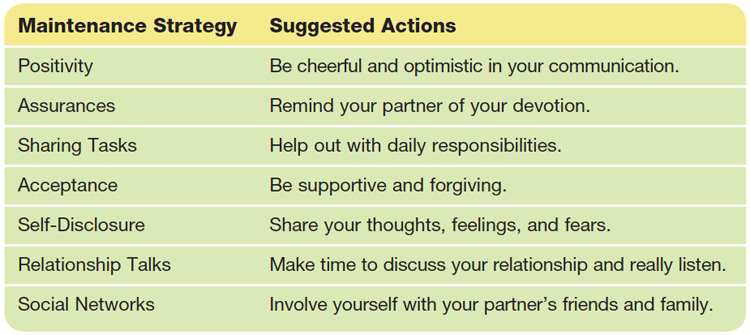9.5.1 Maintenance Strategies
Printed Page 300
Maintenance Strategies
Many people believe that love just happens—that once it strikes, it endures. But a basic rule of romantic love is that maintenance is necessary to keep relationships from deteriorating (Stafford, 2003). Relational maintenance refers to using communication and supportive behaviors to sustain a desired relationship status and level of satisfaction (Stafford, Dainton, & Haas, 2000). Across several studies, communication scholar Laura Stafford has observed seven strategies that satisfied couples—no matter their ethnicity or sexual orientation—routinely use to maintain their romances (Stafford, 2010). (See Table 9.2 for an overview of these categories.)
Relational Maintenance
Watch this clip to answer the questions below.

Question
Positivity Positivity includes communicating in a cheerful and optimistic fashion, doing unsolicited favors, and giving unexpected gifts. Partners involved in romantic relationships cite positivity as the most important maintenance tactic for ensuring happiness (Dainton & Stafford, 1993). This holds true for men and women in straight relationships (Stafford, 2010), and for same-sex partners in gay and lesbian romances (Haas & Stafford, 2005). You use positivity when:6
- You try to make each interaction with your partner enjoyable.
- You try to build your partner up by giving him or her compliments.
- You try to be fun, upbeat, and romantic with your partner.
You undermine positivity when:
- You constantly look for and complain about problems in your relationship without offering solutions.
- You whine, pout, and sulk when you don’t get your way.
- You criticize favors and gifts from your partner.
Assurances The second-most-powerful maintenance tactic in boosting relationship satisfaction is assurances: messages that emphasize how much a partner means to you, how important the relationship is, and that describe a secure future together. Assurances may be expressed directly, such as saying, “I love you” or “I can’t see myself ever being with anyone else but you.” You may also communicate assurances more indirectly, by emphasizing the value you place on your time together—for example, sending a text message saying, “I can’t wait to see you again” or “I’m really looking forward to tonight” (Rabby, 1997). You use assurances when:
- You regularly tell your partner how devoted you are to your relationship.
- You talk about future plans and events to be shared together (e.g., anniversaries, vacations, marriage, children).
- You do and say things to demonstrate the depth of your feelings for your partner.
You undermine assurances when:
- You flirt with others and talk about how attractive they are in front of your partner.
- You tell your partner not to count on anything long-term.
- You systematically avoid pledging love or fidelity to your partner.

Sharing Tasks The most frequently practiced form of maintenance is sharing tasks. This involves taking mutual responsibility for chores and negotiating an equitable division of labor. Although this may sound like something that only serious, cohabiting, or married couples face, sharing tasks is relevant for all couples, and includes responsibilities like providing transportation to work or campus, running errands, and making reservations for dinner. You share tasks when:
- You try to pitch in equally on everyday responsibilities.
- You ask your partner how you can help out.
- You make an effort to handle tasks before your partner asks you to do them.
You undermine task sharing when:
- You strategically avoid having to do your share of the work.
- You never ask your partner how you can help out.
- You expect your partner to run errands and do chores for you, without reciprocating.
Acceptance Part of what builds a strong sense of intimacy between romantic partners is the feeling that lovers accept us for who we really are, fully and completely, and forgive us our flaws. Acceptance involves communicating this affirmation and support. You convey acceptance when:
- You forgive your partner when he or she makes mistakes.
- You support your partner in his or her decisions.
- You are patient with your partner when he or she is irritable or in a bad mood.
You undermine acceptance when:
- You hold grievances and grudges against your partner.
- You tell your partner that you wish he or she were different.
- You critique your partner’s appearance, personality, beliefs, and values.
Self-Disclosure An essential part of maintaining intimacy is creating a climate of security and trust within your relationship. This allows both partners to feel that they can disclose fears and feelings without repercussion. To foster self-disclosure, each person must behave in ways that are predictable, trustworthy, and ethical. Over time, consistency in behavior evokes mutual respect and the perception that self-disclosure will be welcomed. You use self-disclosure when:
- You tell your partner about your fears and vulnerabilities.
- You share your feelings and emotions with your partner.
- You encourage your partner to disclose his or her thoughts and feelings, and offer empathy in return.
You undermine self-disclosure when:
- You disparage your partner’s perspective.
- You routinely keep important information hidden from your partner.
- You betray your partner by sharing confidential information about him or her with others.

Table 9.2 Romantic Relationship Maintenance Strategies

Relationship Talks Romantic maintenance includes occasionally sitting down and discussing the status of your relationship, how you each feel about it, and where you both see it going. Relationship talks allow you to gauge how invested you each are and whether you agree on future plans and goals. They also provide a convenient forum for expressing and resolving concerns, forestalling future conflict. You encourage relationship talks when you:
- Set aside time in your schedule to chat about your relationship.
- Openly and respectfully share your relationship concerns with your partner.
- Encourage your partner to share his or her feelings about the relationship with you.
You undermine relationship talks when you:
- React defensively and egocentrically whenever your partner shares relationship concerns.
- Avoid or refuse to have relationship talks with your partner.
- Actively ridicule the need to discuss the relationship.
Social Networks Romances are more likely to survive if important members of the couples’ social networks approve of the relationship (Felmlee, 2001). For example, communication scholars Malcolm Parks and Mara Adelman (1983)measured how much support romantically involved individuals received from their partners’ friends and family, what percentage of their partners’ network they had met, and how often they communicated with these people. Using these factors and others, Parks and Adelman were able to predict with 88 percent accuracy which relationships would survive. What were the strongest determinants of whether couples stayed together? Support from family and friends and regular communication with one’s partner.
Fostering healthy relationships with surrounding friends and family appears especially crucial for those involved in interethnic relationships (Baptiste, 1990), and for gay and lesbian couples. Approximately 67 percent of intereth-nic marriages end in divorce, compared with an overall divorce rate of 40 percent, the largest reasons being lack of network support and cultural disapproval (Gaines & Agnew, 2003). Gay and lesbian couples report having suppor-tive environments such as churches or clubs and being treated “the same” as straight couples by their friends and family as especially important for their relationship stability and satisfaction (Haas & Stafford, 1998). You foster supportive social networks when you:
- Tell your partner how much you like his or her friends and family.
- Invite your partner’s friends or family members to share activities with the two of you.
- Willingly turn to family members of both partners for help and advice when needed.
You undermine social networks when you:
- Make critical and disparaging remarks regarding your partner’s friends and family.
- Intentionally avoid encounters with your partner’s friends and family.
- Demand that your partner choose between spending time with you and spending it with friends and family.